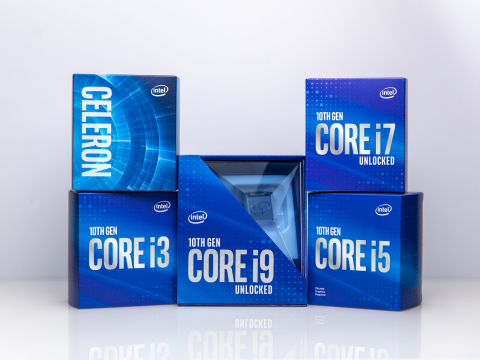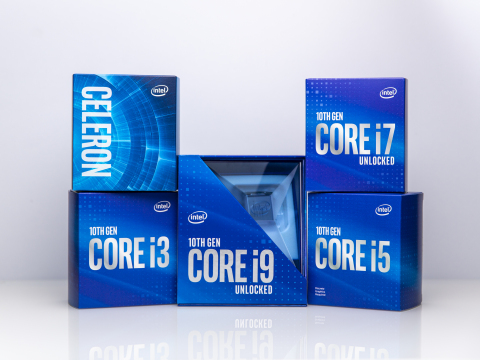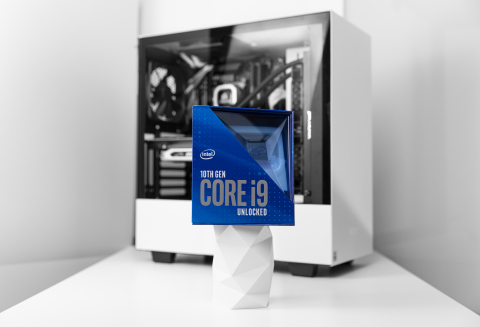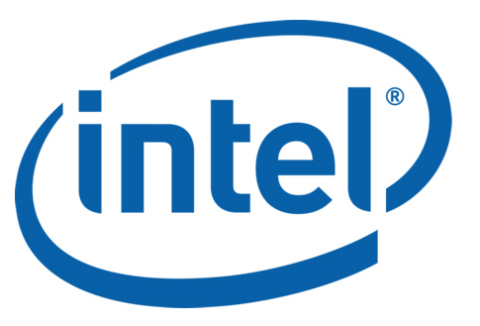SANTA CLARA, Calif.--(BUSINESS WIRE)--What’s New: Intel introduced today the 10th Gen Intel® Core™ S-series desktop processors, including Intel’s flagship Core i9-10900K processor, the world’s fastest gaming processor1. With speeds reaching up to a maximum of 5.3 GHz with Intel® Thermal Velocity Boost2 out of the box, 10th Gen Intel Core desktop processors deliver real-world performance for a new level of experience in gaming.
“Intel is committed to enabling the future of powerful desktop gaming by continuously pushing the performance boundary to deliver an amazing PC gaming experience. The 10th Gen Intel Core S-series for desktops, and the Intel Core i9-10900K processor, the world’s fastest gaming processor, reinforces our commitment to the gaming and enthusiast communities.”
– Brandt Guttridge, Intel senior director of the Desktop Products Group
Why It’s Great for Gaming and Overclocking: At the top of the stack is the unlocked 10th Gen Intel Core i9-10900K, the world’s fastest gaming processor1, featuring up to 10 cores, 20 threads and DDR4-2933 memory speeds. The i9-10900K processor powers the ultimate gaming experience, allowing more tuning control, faster multitasking and smoother gameplay. The new Intel® Turbo Boost Max Technology 3.0 provides automatic performance boosts on lightly threaded applications, while per-core hyperthreading control allows experienced overclockers to decide which threads to turn on or off on a per-core basis. Improvements in this generation include:
- Up to 187 frames per second3 for in-game performance while streaming and recording, and up to 63 percent more frames per second4 in gaming compared with a 3-year-old PC.
- Up to 12 percent faster5 video editing compared with the previous generation, and up to 15 percent faster6 video editing compared with a 3-year-old PC.
- Up 18 percent faster7 4K video editing compared with the previous generation, and up to 35 percent faster8 4K video editing compared with a 3-year-old PC.
- Up to 31 percent better overall system performance compared with a 3-year-old PC9, 10.
About Key Features and Capabilities: The 10th Gen Intel Core S-series processors deliver smooth gameplay through best-in-class connectivity11, immersive entertainment and enhanced streaming.
- Intel Thermal Velocity Boost: Gamers and creators get an opportunistic and automatic boost across single-core and multicore workloads, with up to 5.3 GHz.
- Intel Hyperthreading Technology: Now across 10th Gen Intel Core i9 to i3 processors.
- Enhanced Core & Memory Overclocking3: Gain ultimate control when overclocking your processor and key system components with features enabled by new unlocked and overclockable 10th Gen Intel Core processors.
- Intel® Ethernet Connection I225: Now available on the 10th Gen platform, 2.5G Intel Ethernet Connector I225 delivers greater than two times the network speeds of 1GB Ethernet on existing cabling.
- Intel® Wi-Fi 6 AX201: Now integrated into 10th Gen Intel Core desktop processors, Intel Wi-Fi 6 (Gig+) delivers responsive gameplay, nearly three times faster12 downloads and more reliable connections. Delivers best-in-class connectivity11 with the freedom and flexibility to game or create anywhere throughout the home or office.
When You Can Get It: 10th Gen Intel Core S-series processors are expected to be available globally through normal retail channels and in desktops sold worldwide by OEMs and channel system integrators, starting in May.
More Context: 10th Gen Intel Core Processors – Amazing Gaming Starts With Intel (Press Kit) | More Powerful Edge Processing with 10th Generation Intel Core Processors for IoT and Edge | A New Power Standard has Desktops Sipping Energy when Idling | Intel® Z490 Chipset (Product Brief)
About Intel
Intel (Nasdaq: INTC) is an industry leader, creating world-changing technology that enables global progress and enriches lives. Inspired by Moore’s Law, we continuously work to advance the design and manufacturing of semiconductors to help address our customers’ greatest challenges. By embedding intelligence in the cloud, network, edge and every kind of computing device, we unleash the potential of data to transform business and society for the better. To learn more about Intel’s innovations, go to newsroom.intel.com and intel.com.
All information provided here is subject to change without notice. Contact your Intel representative to obtain the latest Intel product specifications, roadmaps, and related information.
Performance results are based on testing as of April 17, 2020 in configurations and may not reflect all publicly available updates. See backup for configuration details. No product or component can be absolutely secure.
Software and workloads used in performance tests may have been optimized for performance only on Intel microprocessors. Performance tests, such as SYSmark and MobileMark, are measured using specific computer systems, components, software, operations and functions. Any change to any of those factors may cause the results to vary. You should consult other information and performance tests to assist you in fully evaluating your contemplated purchases, including the performance of that product when combined with other products. For more complete information about performance and benchmark results, visit http://www.intel.com/benchmarks
Intel technologies may require enabled hardware, software or service activation.
Your costs and results may vary.
Statements in this document that refer to Intel’s plans and expectations for the quarter, the year, and the future, are forward-looking statements that involve a number of risks and uncertainties. A detailed discussion of the factors that could affect Intel’s results and plans is included in Intel’s SEC filings, including the annual report on Form 10-K.
Altering clock frequency or voltage may void any product warranties and reduce stability, security, performance, and life of the processor and other components. Check with system and component manufacturers for details.
1As measured by in-game benchmark mode performance (score or frames per second) where available, or frames per second where benchmark mode is unavailable. PC Gaming Processors Compared: 10th Gen Intel® Core™ i9-10900K, Intel® Core™ i9-9900KS, AMD Ryzen™ 9 3950X. Prices of compared products may differ. Configurations: Graphics: Nvidia GeForce RTX 2080 Ti, Memory: 4x8GB DDR4 (2666, 2933 or 3200 per highest speed of the corresponding processor), Storage: Intel Optane SSD 905P, OS Windows 10 Pro 1909 v720 19H2(RS6). Results: 10th Gen Intel® Core™ i9-10900K scored better on the majority of the 25+ game titles tested. Intel will be marketing the 10th Gen Intel® Core™ i9-10900K with the tag line “Elite Real World Performance” in certain jurisdictions, including PRC and Vietnam. Intel will be marketing the 10th Gen Intel® Core™ i9-10900K with the tag line “Intel’s Fastest Gaming Processor” in certain jurisdictions, including Argentina, Belarus, Belize, Chile, Egypt, El Salvador, Guatemala, Honduras, Italy, Japan, Panama, Peru, Saudi Arabia, Turkey, Russia, and Ukraine. If you are media, an influencer or a marketer from these countries, or otherwise communicating directly to residents in these countries (e.g., on local-language social media), please only refer to the tag line Intel will be using in that country in lieu of the claim on this slide/document.
2Includes the effect of Intel® Thermal Velocity Boost (Intel® TVB), a feature that opportunistically and automatically increases clock frequency above single-core and multi-core Intel® Turbo Boost Technology frequencies based on how much the processor is operating below its maximum temperature and whether turbo power budget is available. The frequency gain and duration is dependent on the workload, capabilities of the processor and the processor cooling solution.
3As measured by Megatasking workload on PUBG on 10th Gen Intel® Core™ i9-10900K.
4As measured by Players Unknown Battleground (PUBG) on 10th Gen Intel® Core™ i9-10900K vs. 7th Gen Intel® Core™ i7-7700K.
5As measured by Adobe Lightroom Classic workload RUG 1010 on Intel® Core™ i9-10900K vs. Intel® Core™ i9-9900K.
6As measured by Adobe Lightroom Classic workload RUG 1010 on Intel® Core™ i9-10900K vs. Intel® Core™ i7-7700K.
7As measured by Adobe Premier Pro CC workload RUG 1209 on Intel® Core™ i9-10900K vs. Intel® Core™ i9-9900K.
8As measured by Adobe Premier Pro CC workload RUG 1209 on Intel® Core™ i9-10900K vs. Intel® Core™ i7-7700K.
9As measured by SYSMark*2018 on Intel® Core™ i9-10900K vs. Intel® Core™ i7-7700K.
10Intel technologies may require enabled hardware, software or service activation.
11‘Best in Class Wi-Fi 6’: Intel® Wi-Fi 6 (Gig+) products support optional 160 MHz channels, enabling the fastest possible theoretical maximum speeds (2402 Mbps) for typical 2×2 802.11ax PC Wi-Fi products. Premium Intel® Wi-Fi 6 (Gig+) products enable 2-4X faster maximum theoretical speeds compared standard 2×2 (1201 Mbps) or 1×1 (600 Mbps) 802.11ax PC Wi-Fi products, which only support the mandatory requirement of 80 MHz channels. Gigabit Wi-Fi Requirements: To achieve speed of over 1 Gbps requires Gig internet service, router/gateway with either Wi-Fi 6 or 11ac with 160 MHz channel support, and PC with Intel® Wireless 9260/9560 or Intel® Wi-Fi 6 (Gig+) AX200/AX201.
12WiFi 6 ‘Nearly 3X Faster’: 802.11ax 2×2 160MHz enables 2402 Mbps maximum theoretical data rates, ~3X (2.8X) faster than standard 802.11ac 2×2 80MHz (867 Mbps) as documented in IEEE 802.11 wireless standard specifications, and require the use of similarly configured 802.11ax wireless network routers.
© Intel Corporation. Intel, the Intel logo and other Intel marks are trademarks of Intel Corporation or its subsidiaries. Other names and brands may be claimed as the property of others.





